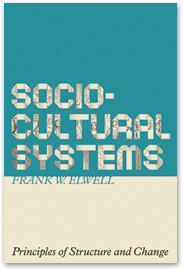
Sociocultural Systems: Principles of Structure and Change Macrosociology: Four Modern Theorists A Commentary on Malthus" 1798 Essay as Social Theory Great Classical Social Theorists In the Classical Tradition: Modern Social Theorists Dr. Elwell's Professional Page
|
rbert Spencer's Evolutionary Sociology T. Robert Malthus [1766-1834] | |
|
T. Robert Malthus on the Poor
By Frank W. Elwell
Consistent with his functionalist orientation, Malthus asserts that a
working class is absolutely essential to every society. Labor will always be
necessary to wrest subsistence from nature. The institution of private
property and self-interest provide the motivation for human thought and
action. It is the goad of necessity—t he desire to avoid poverty or to
obtain riches—that motivates much of human industry. Unequal rewards for
industry and idleness are the “master spring” of human activity.
The desire for riches, or the fear of poverty, also motivates humans to
regulate the number of their offspring. The poor represent that portion of
the population that is not supported through existing technology and
distr
If the proportion between the natural increase of population and food which
I have given be in any degree near the truth, it will appear, on the
contrary, that the period when the number of men surpass their means of
subsistence has long since arrived, and that this necessity oscillation,
this constantly subsisting cause of periodical misery, has existed ever
since we have had any histories of mankind, does exist at present, and will
for ever continue to exist, unless some decided change take place in the
physical constitution of our nature (50).
Malthus maintains that there is a necessity for both workers and proprietors
in all societies beyond hunting and gathering levels. He does not see
poverty as a consequence of moral worth or the fitness to survive. Labor is
the only property owned by the poor, which they sell in exchange for money
to purchase the necessities of life. He views severe inequality with horror
and asserts that it is not necessary nor very useful to the bulk of mankind.
We are morally obligated to alleviate the plight of the poor, Malthus says,
though we must recognize that we can never fully do so. His critique of the
British poor laws stems from three sources: 1) His functional analysis of
poverty, welfare, and population growth; 2) The greatest good for the
greatest number of people; and 3) The high value he places on human liberty.
Whether conceived in a purposeful manner to hold down the costs of labor, or
conceived out of compassion to alleviate distress--the provision of welfare
removes the necessity of some population checks on the poor. The result of
this removal is that population rises, the market becomes flooded with new
laborers and those willing to work longer and harder to support their
increase
Malthus acknowledges that it may appear hard in individual circumstances,
but holding dependent poverty disgraceful, encouraging people to use
preventive checks, will promote the greatest good for the greatest
number. If you are going to provide assistance, Malthus asserts, you must
give power to a certain class of people who will manage the necessary
institutions to provide the relief. These institutions will be charged with
formulating rules in order to discriminate between those who are worthy and
unworthy of aid. This represents a tremendous power over the life affairs of
all who are forced to ask for support. He cites a frequent complaint of the
poor regarding welfare administrators, and observes (somewhat
sociologically): “The fault does not lie so much in these persons, who
probably, before they were in power, were not worse than other people, but
in the nature of all such institutions” (31).
Generally, Malthus believes, a government that attempts to “repress
inequality of fortunes” through welfare mechanisms will be
This analysis of welfare does not lead Malthus to advocate that the poor
should be left to their plight. Rather, he suggests some institutional
reforms--consistent with the law of population--that will serve to make a
more just, equitable society. Malthus’ proposals are an attempt to tie
population growth itself to increases in the produce of the land. Malthus’
proposals are an attempt to tie population growth itself to increases in the
produce of the land. He advocates freedom of movement so that people can go
to areas where work is plentiful. Incentives for tilling new lands to
increase production and furnish an “increasing quantity of healthy work”
(32). He also favors the establishment of county workhouses. The intent of
these workhouses is to provide a place “where any person, native or
foreigner, might do a days work at all times and receive the market price
for it.” The fare should be hard, those that are able would be obliged to
work for the prevailing wage. The workhouses are intended to eliminate the
most severe distress while maintaining the necessary incentive for human
industry and the operation of preventive checks on population.
Finally, Malthus clearly states, human benevolence and compassion must
augment these social policies.
For Malthus, “the proper office of benevolence” is to soften the “partial
evils” arising from people acting in their own self-interests. But
compassion and benevolence can never replace self-interest as the mainspring
of human action. The poor, Malthus maintains, will always be among us. But
it is our moral obligation to minimize inequalities as much as the laws of
nature will allow. He points out that while inequality is essential to
motivate human beings to activity and productivity, the inequality need not
be as great as existed in his own society.
Malthus’ 1798 Essay was designed to demonstrate the impossibility of
a social utopia--but he insisted that we could (indeed, should) reduce
social and economic inequality through structural reform. In the next essay
we will be looking at Malthus’s contributions to theories of social and
biological evolution. For a more extensive discussion of Malthus’s theories refer to Macro Social Theory by Frank W. Elwell. Also see Sociocultural Systems: Principles of Structure and Change to learn how his insights contribute to a more complete understanding of modern societies.
Bibliography
Elwell, F. (2009), Macrosociology: The Study of Sociocultural Systems.
Lewiston: Edwin Mellen Press.
Elwell, F. (2013), Sociocultural Systems: Principles of Structure and
Change. Alberta: Athabasca University Press.
Malthus, T. R. (Thomas Robert) (2012-05-12). An Essay on the Principle of
Population. Kindle Edition.
Referencing this Site To reference T. Robert Malthus on the Poor you should use the following format: Elwell, Frank W., 2013, "T. Robert Malthus on the Poor," Retrieved August 31, 2003, [use actual date] http://www.faculty.rsu.edu/~felwell/Theorists/Essay/Malthus2.htm ©2007 Frank Elwell, Send comments to felwell at rsu.edu
|
 ibution systems. Poverty (and its consequent misery and vice),
according to Malthus, is an outgrowth between our ability to produce food
and our tendency to reproduce the species. Because of population’s tendency
to outstrip available food supplies, the mass of people are subjected to
physical distress (lack of food and other necessities) and consequently
limit population increase (either through preventive checks, or failing
those, positive checks). It is because of this imbalance between production
and reproduction, Malthus states, that “millions and millions of human
existences have been repressed.” This necessity to repress population has
existed in every society in the past, exists in the present, and will always
exist.
ibution systems. Poverty (and its consequent misery and vice),
according to Malthus, is an outgrowth between our ability to produce food
and our tendency to reproduce the species. Because of population’s tendency
to outstrip available food supplies, the mass of people are subjected to
physical distress (lack of food and other necessities) and consequently
limit population increase (either through preventive checks, or failing
those, positive checks). It is because of this imbalance between production
and reproduction, Malthus states, that “millions and millions of human
existences have been repressed.” This necessity to repress population has
existed in every society in the past, exists in the present, and will always
exist. d number of offspring. The fatal flaw of the poor laws is that it
encourages population growth without increasing provisions to support that
growth In accordance with the law of supply and demand, poor laws will
contribute to “raise the price of provisions and
d number of offspring. The fatal flaw of the poor laws is that it
encourages population growth without increasing provisions to support that
growth In accordance with the law of supply and demand, poor laws will
contribute to “raise the price of provisions and “destructive of
human liberty itself.” He also greatly fears concentrating so much power
into the hands of the state--as absolute power corrupts absolutely. Finally,
Malthus is also concerned with the effect of dependence on the poor
themselves. Hard labor, he concedes, is evil, but dependence is far worse.
In our attempts to alleviate the plight of the poor through welfare laws we
sacrifice the liberties and freedom of the poor, subjecting them to
“tyrannical regulations” in exchange for promises of relief. But society
cannot fulfill its part of the bargain, cannot eliminate the distresses of
poverty without removing necessary checks on population--thus creating more
poor. The poor are forced to sacrifice their liberty and get little in
return.
“destructive of
human liberty itself.” He also greatly fears concentrating so much power
into the hands of the state--as absolute power corrupts absolutely. Finally,
Malthus is also concerned with the effect of dependence on the poor
themselves. Hard labor, he concedes, is evil, but dependence is far worse.
In our attempts to alleviate the plight of the poor through welfare laws we
sacrifice the liberties and freedom of the poor, subjecting them to
“tyrannical regulations” in exchange for promises of relief. But society
cannot fulfill its part of the bargain, cannot eliminate the distresses of
poverty without removing necessary checks on population--thus creating more
poor. The poor are forced to sacrifice their liberty and get little in
return.
